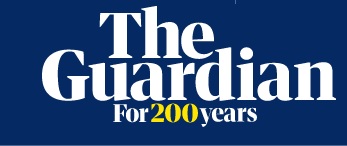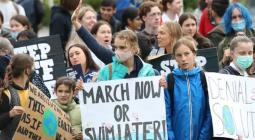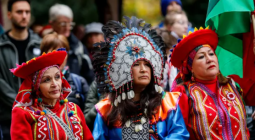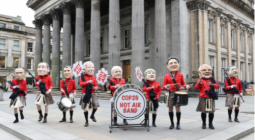‘I have a voice’: African activists struggle to attend UN climate talks in Egypt
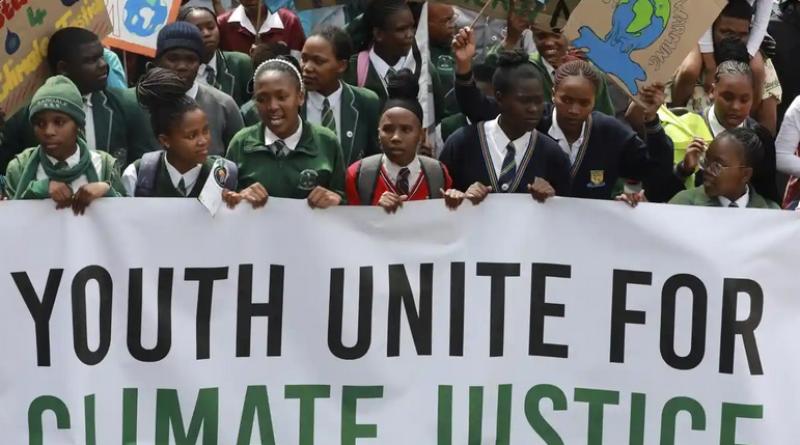
Young campaigners from the continent most affected by the climate crisis face financial and accreditation difficulties for Cop27
African climate activists from some of the countries most affected by global heating say they are struggling to get access to the UN climate talks in Egypt in November.
Cop27, which has been termed “the African Cop”, threatens to take place without African activists advocating for communities devastated by drought, floods and fossil fuel projects in the negotiations when life-or-death decisions about climate finance will be made.
Africa is the continent most affected by the climate breakdown. So far this year, hundreds of people have died from floods and landslides in Nigeria and Uganda while as many as 37 million face starvation after four consecutive droughts in the greater Horn of Africa. It’s also the continent which has contributed least to the climate crisis.
Yet just over 20% of grassroots activists have secured accreditation, and only a handful have funding to cover expenses such as travel, accommodation and visas, according to a coalition of African youth climate leaders. With just over a month to go before negotiations open and affordable hotels in short supply, the coalition, which includes youth groups Fridays for Futures and Riseup in Africa, conducted the survey to review progress.
Despite reaching out to hundreds of non-profits and foundations for help securing badges – which are required for people to enter the negotiating rooms – not a single young activist from countries including Egypt, Burundi, the Democratic Republic of Congo, Mali, Tanzania, Morocco, Chad, South Africa, Benin Republic and Somalia has so far secured a place at Cop27.
Africa has the youngest population in the world, with 70% of sub-Saharan Africans under the age of 30.
“I have a voice, I want the privilege to speak,” said Goodness Dickson, 29, from Abuja, Nigeria, who carried out the survey. “Despite Egypt being called an African Cop, we’re having a very serious challenge and many countries most affected by the climate crisis won’t be represented.”
According to Dickson, organisations which promised youth leaders conference badges now say they did not receive enough of them to share. Others simply haven’t responded.
“Everyone I reached out to said there are no more slots. I’ve been invited to speak at three different events and they all say they have no funding for travel … I gave up,” said Jennifer Olachi Uchendu, founder of the Nigerian sustainability organisation SustyVibes.
“This is the African Cop, they say, but it seems to be even worse to access … and voices like mine who advocate for climate justice, loss and damage finance may be seen as threats. Is there really a point to all of this? The multiple conversations?” added Uchendu, who also runs a project supporting Africans suffering from climate anxiety.
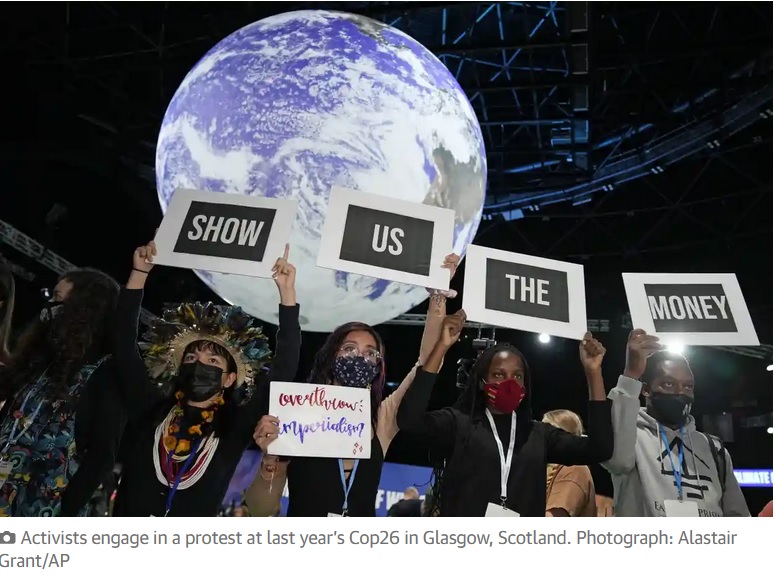
Last year at Cop26 in Glasgow, Uchendu was among the few African activists able to attend due to similar challenges with accreditation, funding and Covid vaccinations – which at the time were available to less than 5% of people across the African continent. Dickson was stopped from boarding his flight as he was not fully vaccinated.
In the end, concrete pledges on loss and damage for developing nations which have contributed least to global heating but are affected most by it were once again shelved at the behest of rich polluting nations. The 54 countries in Africa combined account for 15% of the world’s population but contribute less than 4% of global greenhouse emissions – in contrast to 23% by China, 19% by the US and 13% from the European Union.
Egypt, which holds the presidency for Cop27, has boasted that the conference in Sharm el-Sheikh is on track to be one of the most attended with more than 35,000 people registered to take part.
But registration is not accreditation – the all-important badge gives access to the main events and negotiation areas, which are where decisions on climate financing, agriculture, water scarcity and biodiversity are discussed. Even then, only a handful of civil society representatives are permitted inside each meeting room, with no guarantee of addressing the country delegates and negotiators.
Those who have secured badges still face multiple challenges. Egypt’s confusing visa system requires people from dozens of African and Asian countries to apply for pre-approval, with no exceptions for Cop27 participants, a process that can take weeks.
Mana Omar, 27, is a climate justice activist in Kenya’s arid Kajiado county where pastoral Indigenous communities have been extremely hard hit by the prolonged drought. Omar got her badge through UN Women, but is struggling to finance the trip. “It’s still 50:50,” she said. “It’s very, very hard to get the funding and the hotel costs are too high.”
“I need to be there to advocate for communities like mine to be prioritised in loss and damage finance. We are at the frontline of the climate crisis, facing the risk of extinction,” said Omar, founder and CEO of Spring of the Arid and Semi-Arid Lands and member of Fridays for Future.
Travel and accommodation costs are extortionate with no sanctions for price gouging or cancellations – leaving many non-profits that booked rooms early scrambling to find alternatives, according to Dharini Parthasarathy, global communications lead for the Climate Action Network. “It’s a free-for-all. The logistics are serious barriers.”
Amid pressure from civil society groups, Egyptian authorities recently promised to subsidise 400 rooms for young people, though few details are available. Egypt, where water scarcity is approaching crisis levels, also announced Coca-Cola as its sponsor, despite the company’s large water guzzling and pollution footprint across the continent.
“Indigenous lives matter. If Coca-Cola is going, our voices have to be heard. I have to get there,” said Ina-Maria Shikongo, 43, a climate activist and artist from Namibia looking for funding. “We have to be there pushing political leaders for loss and damage financing and a fossil fuels non-proliferation treaty.”
After months of hard work and hundreds of emails, Grace Kimaru, 23, founder of the conservation group Foster Green in Nairobi, Kenya, secured a badge and funding. “It was a struggle, but I will be at Cop27 and try my level best to be heard. African activists and environmentalists should be at the table and taken seriously. Young people have to be involved to safeguard the future and the planet. I hope this will be the Cop of action when pledges are implemented, not more blah blah blah.”
